What is The Best Word Count For SEO? (Process)
Georgi Todorov
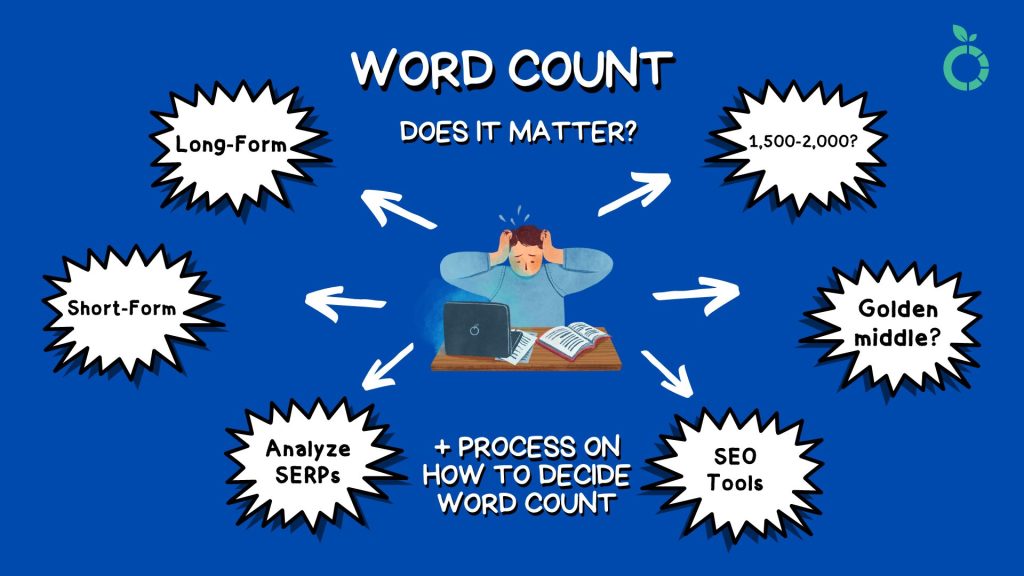
If you have ever written, or even thought of writing, blog content, it’s very likely that you have wondered what would the best word count be for SEO.
And the opinions in the industry are quite divided as well. There are advocates of both short-form and long-form content.
But what if I tell you that there is a way to approach this question topic by topic?
In this article, we will cover if word count really matters and how to decide how many words to write in blogs or product pages.
Does Word Count Matter For SEO?
First things first, word count is not a ranking factor, as confirmed by Google’s John Mueller.
In fact, what is really important for Google is that your readers are satisfied with your content and that you have covered the topic in full.
And it makes sense – if you do not cover the topic in full and do not satisfy the user intent, they are going to bounce and read someone else’s article.
That would push you down in the rankings if users always have to read another article on the topic after yours.
Sometimes that could be 200 words to the question ”what is the meaning of fyi”. Just like it could be 3,000+ words for the topic of ”SEO ultimate guide”.
This is why there is no such thing as ”the golden middle”.
SEO experts have tried to figure out a golden middle, such as Brian from Backlinko who published an SEO study, showcasing that the objectively best word count is 1,447.
But it’d be weird to write, let’s say, 1,500 words on a very basic question. Also, it will be disadvantageous to write only 1,500 words on an ultimate guide.
Disadvantageous in the sense that your competitors have covered the topic in full, with 10 sub-headings and long-form content.
So the answer is ”yes”, word count matters.
And, as I mentioned in the beginning, there is an approach to figuring out a rough estimate of how much word count should your content be in order to compete on the SERPs.
Determining Blog Word Count
The key to understanding how much you should write in your blog content or product pages is by analyzing the competition.
In other words – what works and what Google thinks is best for the search query.
In this section, we are going to look at 2 example keywords. 1 will be informational intent keywords for a blog with high difficulty and 1 keyword that is easy to rank for due to the weak competition.
1. High Competition SaaS Keyword
Let’s evaluate how many words we would need to write on the topic of ”how to do keyword research”.
Before we proceed, how much do you think we would need to rank on the topic to rank on the 1st page for this keyword, regardless of difficulty and domain authority?
We put the main keyword in LowFruits and analyzed it, extracting its SERPs.
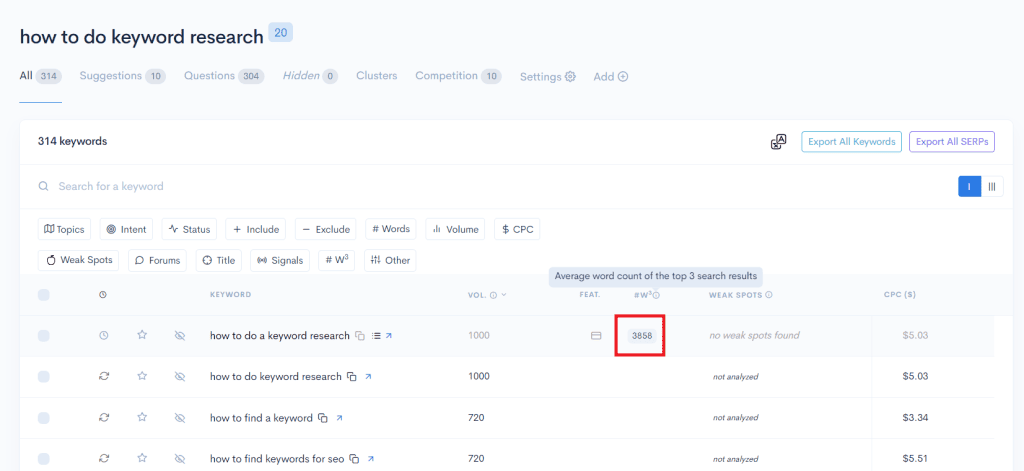
After analyzing the keyword, we can see that the average word count for the top 3 search results is the staggering 3,858.
And it makes sense. The user intent is of a ”101” ultimate guide. The readers want to know everything about the topic, which is why it will act as a pillar article.
But the process doesn’t stop here. We want to dig deeper into the SERPs and see if there are some outliers who have gotten away with shorter-form but higher-quality content pieces.

Upon further investigation, we can see that the first result has a word count of 2,191, which is quite promising, but all of the others are 3,000+ with the occasional 5,000+ from Ahrefs and Neil Patel.
If we would like to rank for it and compete with all of these big players, we would need to write at least 3,000-4,000 words on this topic.
Domain authority and backlinks would play a big role as well, that’s for sure.
So how about we analyze 1 more informational intent keyword, this time of less difficulty?
2. Low Competition Travel Keyword
Let’s say that for your travel blog, you found the low difficulty keyword ”cheap things to buy in belgium”
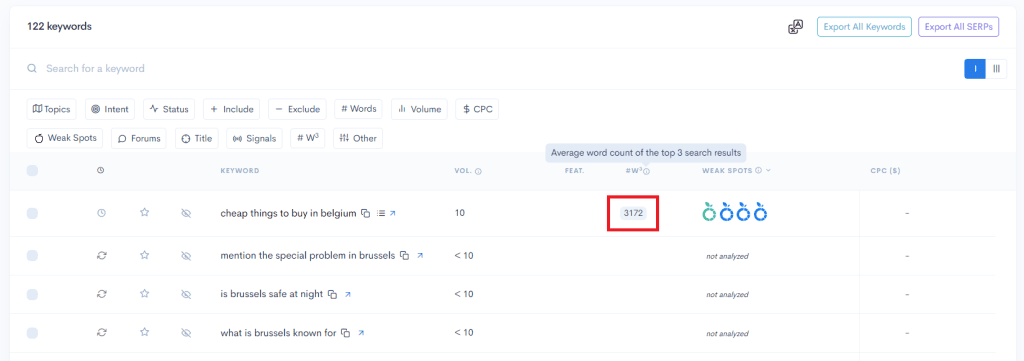
As we analyze the SERPs of this topic, we see that the average word count for the top 3 search results is 3,172 words.
But let’s dive deeper. We want to see how much of a role domain authority plays and how much lower authority websites have to work to catch up.
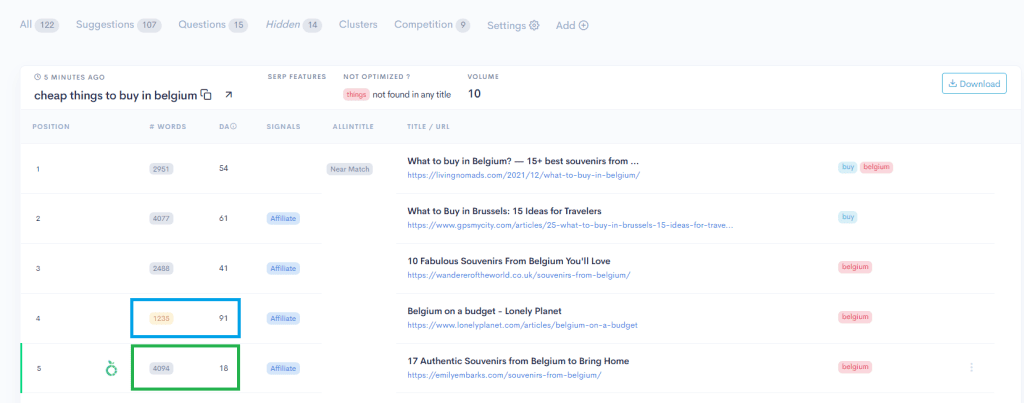
As we continue to further analyze the SERPs, we can see that the 4th position is a website with a very high domain authority and they rank highly after producing a 1,235-word article.
On the other side, lower-DA websites such as personal blogs, have had to write upwards of 4,000 words to compete equally with the higher DA websites.
For this keyword, a combination of decent domain authority and long-form content is what brings websites to the top 3 results.
From a SERP analysis perspective, that would probably return us to the drawing board if this low-volume keyword deserves to be pursued.
By using LowFruits, we can first evaluate the average word count of the top 3 results pages, and then we can dive deeper into the top 10 search results.
The goal of the SERP analysis is to get insights such as:
- What is a rough estimate of the word count that we can expect for this particular topic in order to capture the search intent in full?
- How many words should lower domain authority websites need to write in order to compete with the big industry players
- If there is an outlier with, for example, lower domain authority and lower word count, just how much unique and amazing content did they produce?
This process can also be repeated for e-commerce product pages as well, not only for blog articles.
We can see that a high-volume e-commerce keyword such as ”bleu de chanel”, which is a luxury perfume for men, has an average word count of 638.

Perhaps for this keyword, you wouldn’t go on writing essays and long product descriptions but focus on backlinks and user experience.
Why Long-Form Content Outperforms Short
One question still stands in the whole conversation: Why is long-form content, on average, ranking better than short-form?
There’s the obvious answer that longer content would better satisfy the search intent and better capture the topic.
But it’s not only that. Long-form content also helps you rank for multiple keywords since you are producing more sections and covering the topic more fully.
In fact, this is why long-form content is the industry’s best practice since you can rank for important long-tail keywords.
Moreover, long-form content is also more likely to attract backlinks. In a 2020 study by Ahrefs, they found a correlation between word count and referring domains to the content.
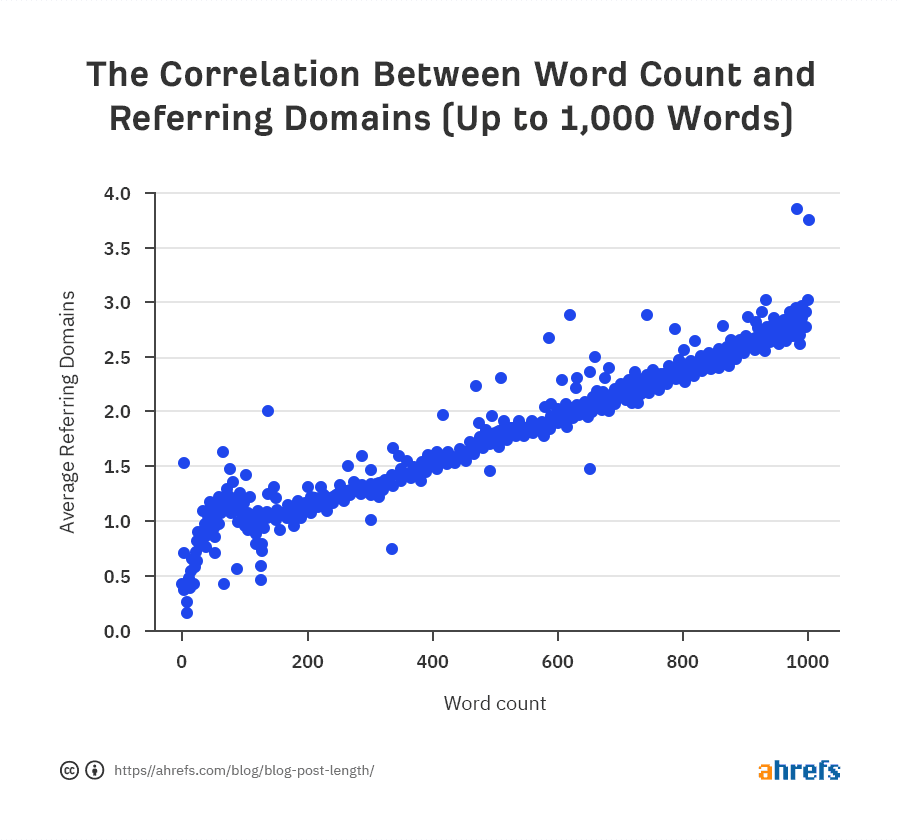
Part of this is because long-form content is better at building industry authority and showcasing in-depth industry knowledge.
When you combine long-form with quality content, there’s a higher chance of ranking and getting backlinks.
But sometimes, there’s a caveat to long-form content. Some websites struggle with content length due to budget issues.
Producing high-quality, well-researched, and unique articles can be challenging to produce and compete against. There are topics that require more resources, time, and research.
Competing against highly authoritative websites that have in-house research and have written 3,000 words can be very demanding.
This is why content marketers should be targeting easier keywords that they can realistically rank for.
SEOs that operate on lower content budgets should use keyword research tools such as LowFruits to find low-hanging fruit keywords that have low competition.
Writing Considerations
We already figured out that word count matters and there is some truth to it if you want to outrank websites with a higher authority, but word count is not everything.
What you should keep in mind when writing is that the first and foremost goal should be to satisfy the search intent of the readers via relevant content.
Content relevancy goes a longer way than just writing fluff and extending the topic. The goal is not to come to a specific number of words.
Content length does not equal content quality. Your goal should be to produce both lengthy and well-researched content.
In this case, quality of information refers to providing statistics and claims that are backed up by authoritative data, or by other relevant sources.
All of it should be your unique view on the topic (when it makes sense) and not what everyone else has written on the topic.
Naturally, for the question of ”how many calories in apples”, you cannot provide your unique view on the topic. But for plenty of other topics such as ”how to do keyword research”, there is a lot to be desired for new perspectives.
Lastly, there should be a clear content structure for all of these keywords. There should be a proper H structure and meta tags. Examples and imagery are also important for content structure.
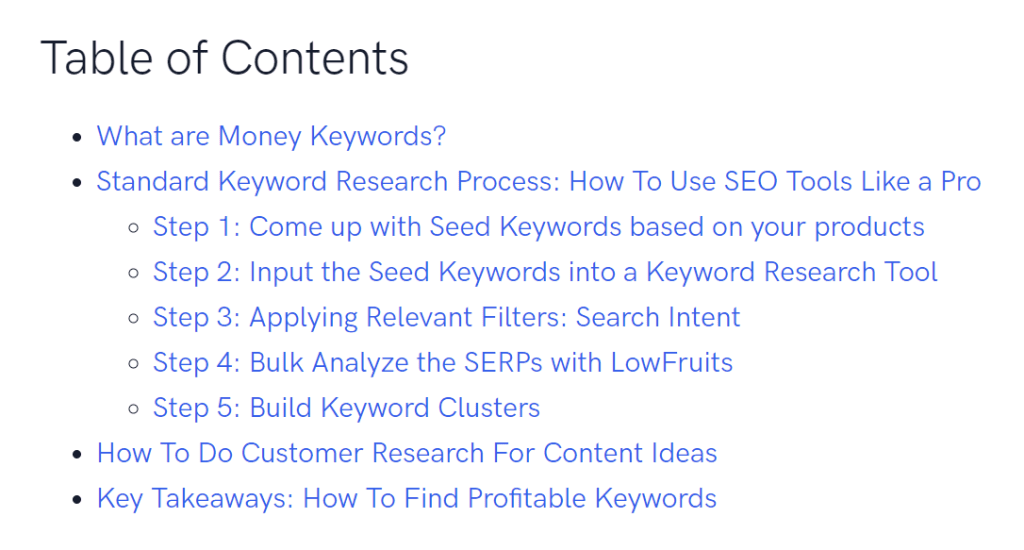
Conclusion & Key Takeaways
- There is no such thing as ”objectively best word count for SEO”, as each keyword is different and serves different intent.
- Analyze the SERPs to get a rough estimate on the competitive landscape in order to figure out word count
- Cover the topic in full, without users having to bounce off your content and look for alternative articles
- Focus on satisfying the search intent and producing relevant content first, and then worry about word count
- Quality of information matters more than word count, but should not come at the expense of word count and vice versa
- Long-form content performs so well is because you are more likely to rank for long tail keywords, better satisfy the search intent, and potentially attract backlinks
- Do not write fluff for the sake of getting to a specific word count
Incredible Article. Thanks.